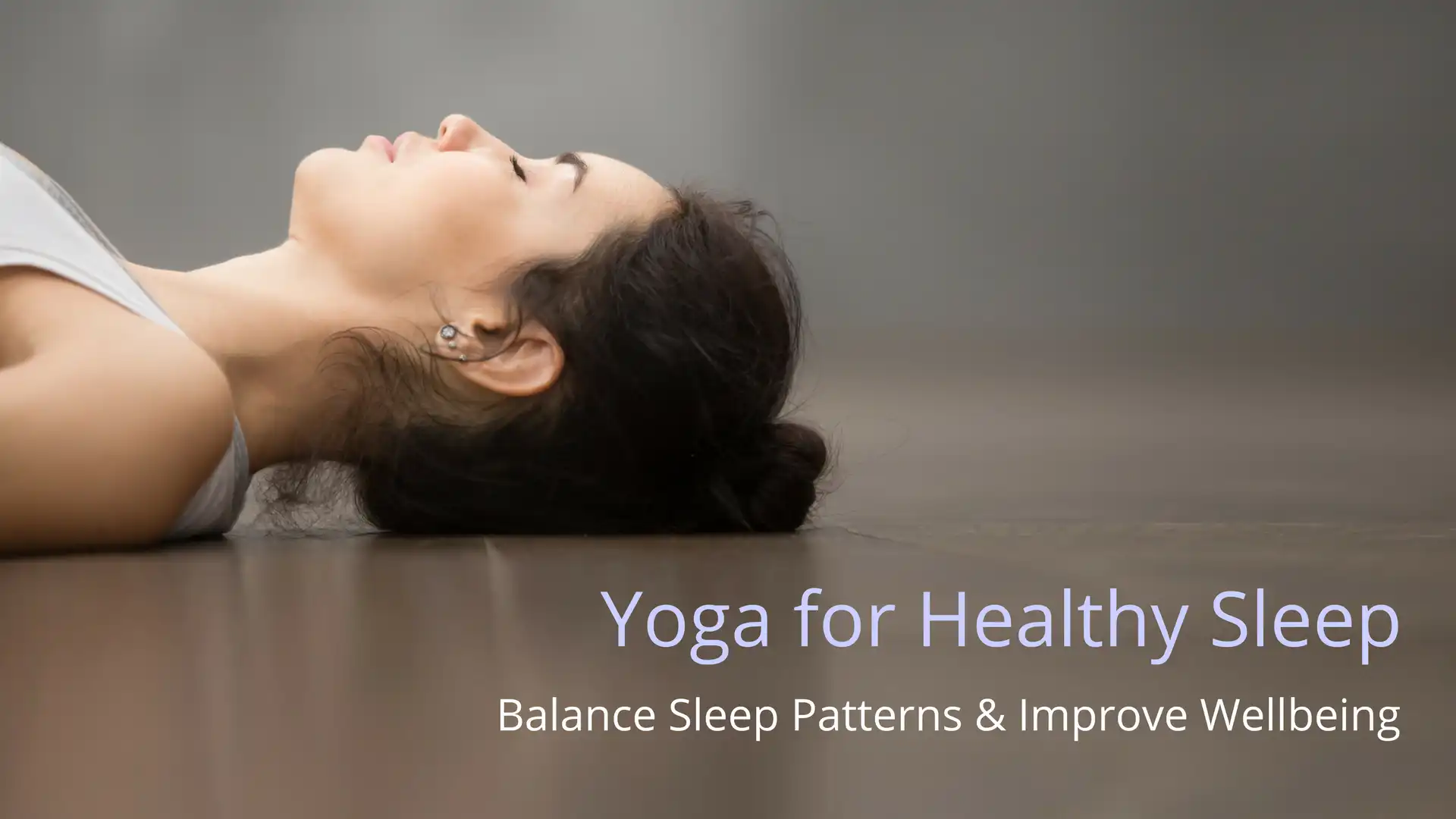The 3 Pillars of Health: The Importance of Sleep and How Yoga Can Help Restore Healthy Sleep Patterns

According to Ayurvedic philosophy, sleep is one of three pillars that endow the body with strength, vigor and healthy growth, which can continue throughout the full span of life. Good-quality sleep is a panacea for a vital health span, your disease-free and functional period of life.
But in this hypercompetitive world, most of us complain of a lack of good-quality sleep. We’re a world of unhealthy sleepers. When you compare the world statistics of insomnia and poor-quality sleep, it is interesting to note that the numbers are nearly similar throughout the world. Within the United States, more than 30 percent of the population suffers from insomnia. Nearly 10 million people in the U.S. use prescription sleep aids. With the current epidemic of insomnia, the question is, can yoga help improve the quality of our sleep? As we shall see below, there is some evidence that this may be the case
The Downsides of Poor-quality Sleep:
· Results in failure to sustain and preserve new memory
· Triggers obesity and other metabolic disturbances
· Contributes to accidents, falls, and traffic mishaps
· Triggers emotional disturbances
· Lowers immunity, making the individual more susceptible to degenerative diseases or infections
· Weakens the neuron-pruning machinery, resulting in less pruning of the neuronal branches, more neuronal noise, and fuzzy memories
The Benefits of Deep Sleep
On the other hand, good-quality sleep helps to maintain a healthy immune system, balances our appetites, makes us less susceptible to degenerative diseases or infections, improves memory, and enhances cognition. Sleep helps us to forget redundant information by turning on the pruning machinery to pare back the “noisy neuronal branches.” Sleep enhances the clearing of harmful toxins thereby reducing the risk of several brain diseases.
Additionally, recent studies have clearly shown the link between moods and sleep. Researchers strongly advise that we need to pay attention not just to the quantity or quality of sleep, but also to the combination of sleep and moods. Carrying negative emotions with you to the bed dampens the sleep response, resulting in interrupted sleep that further spirals into a significant decline in positive moods. Good sleep is also an antidote to fear, as fear responses significantly wane in the slow-wave sleep cycle.
A good night’s sleep enhances the same positive feelings and states of being that we achieve through our yoga practice. Good sleeping habits play a direct role in how full, energetic, and successful our lives can be. There’s no question that we feel better after a good night’s rest. So it seems that if we want to live to our full potential, we must approach sleep as a personal practice.
Sleep experts are now busy trying to discover medicines that might precisely target the molecules to induce sleep. According to data from the Center for Disease Control, about 1 in 25 adults takes a prescription sleep medicine. And Americans are spending a staggering $41 billion on sleep aids and remedies. Melatonin supplements are by far the most common over-the-counter drug recommended to patients, although some of the people who take it complain of feeling groggy and hung over.
How Yoga Helps Improve Sleep Quality
So what is, if any, a perfect drug-free remedy for sleep that has been well studied by scientists?
In a multicenter, randomized, controlled trial for sleep quality among cancer survivors Yoga for Sleep Quality Among Cancer Survivors (1), a yoga program consisting of breathing exercises (pranayama), yoga practice, consisting of 16 gentle Hatha and Restorative yoga postures (asanas) and meditation, was found to be a useful intervention for improving sleep quality and reducing sleep medication use among cancer survivors. The yoga participants in the study both showed greater improvements in sleep quality, quantity and efficiency and daytime dysfunction and reduced their intake of sleep medication.
In several research studies thereafter, mindfulness and meditation were shown to be powerful interventions to improve sleep. In a 2015 study in JAMA Internal Medicine (2), mindfulness meditation practices resulted in improved sleep quality and reduced fatigue in older adults with moderate sleep disturbance. The trial compared meditation to a more structured program focusing on changing poor sleep habits and establishing a bedtime routine.
In another study that involved 18 individuals, participants said that although they were not sleeping more hours, they were sleeping better, waking more refreshed, feeling less distressed about insomnia, and better able to cope when it occurred. Some individuals even experienced the course as a call to action. For them, practicing meditation and following sleep hygiene guidelines became high priorities.
Furthermore, a recent research study found that listening to sounds of nature (for example, rainforest soundscape, leaves rustling in the wind, or water flowing down the rocks) may help with the sleep response by triggering the relaxation response and reducing the body’s natural fight-or-flight. Sounds familiar? How many of us have felt better in a yoga class while listening to the gentle sounds of om or aum during Savasana?
So as yogis, we know that yoga, mindfulness, and meditation can be a drug-free path toward a good night’s sleep, but it’s good to know that science agrees.
Would you like more research about the benefits of Yoga and Sleep? Study: Yoga Helps Overcome Sleep Problems in Cancer Survivors, an article by B Grace Bullock, Ph.D.
Or more on Healthy Aging? Study with Dr. Baxter Bell and YogaUOnline – Yoga for Healthy Aging: Yoga Tools to Keep Your Blood Pressure Balanced.
Reprinted with permission from Yoga for Healthy Aging.
 Ram Rao, Ph.D. With a doctorate in Neuroscience, Ram presently serves as a Research Associate Professor at the Buck Institute for Research on Aging. He focuses on various aspects of age-associated neurodegenerative diseases with emphasis on Alzheimer’s disease. In addition, Ram completed the academic training at the California College of Ayurveda (CCA) and received his certification as Clinical Ayurvedic Specialist. He has been a faculty of the California College of Ayurveda and teaches in their Nevada City location. Ram is also a dedicated Hatha yoga practitioner and is a Registered Yoga Teacher from Yoga Alliance USA. In his spare time, he offers consultations on YAMP techniques (Yoga, Ayurveda, Meditation & Pranayama). Ram has published several articles in major Yoga/Ayurveda magazines and has been a featured speaker at several national and international meetings and symposia. He is a member of the National Ayurvedic Medical Association (NAMA) and is on the Research Board of the Association of Ayurvedic Professionals of North America (AAPNA).
Ram Rao, Ph.D. With a doctorate in Neuroscience, Ram presently serves as a Research Associate Professor at the Buck Institute for Research on Aging. He focuses on various aspects of age-associated neurodegenerative diseases with emphasis on Alzheimer’s disease. In addition, Ram completed the academic training at the California College of Ayurveda (CCA) and received his certification as Clinical Ayurvedic Specialist. He has been a faculty of the California College of Ayurveda and teaches in their Nevada City location. Ram is also a dedicated Hatha yoga practitioner and is a Registered Yoga Teacher from Yoga Alliance USA. In his spare time, he offers consultations on YAMP techniques (Yoga, Ayurveda, Meditation & Pranayama). Ram has published several articles in major Yoga/Ayurveda magazines and has been a featured speaker at several national and international meetings and symposia. He is a member of the National Ayurvedic Medical Association (NAMA) and is on the Research Board of the Association of Ayurvedic Professionals of North America (AAPNA).
Sources
(1) http://ascopubs.org/doi/full/10.1200/jco.2012.43.7707
(2) https://media.jamanetwork.com/news-item/mindfulness-meditation-appears-to-help-improve-sleep-quality/



